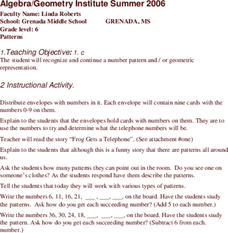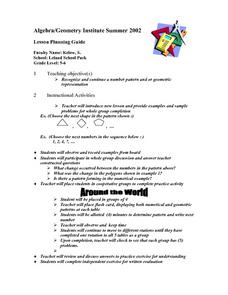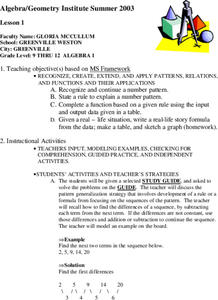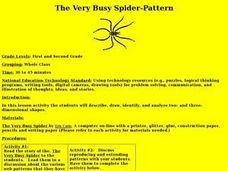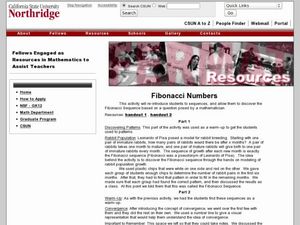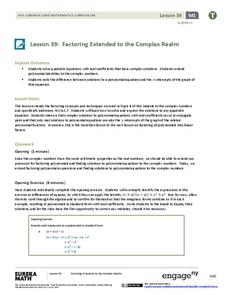Curated OER
Geometric & Arithmetic Patterns
Eighth graders explore sequences. They discuss the difference between an arithmetic sequence and a geometric pattern. Students participate in workstation activities where they determine arithmetic or geometric patterns and predict the...
Curated OER
Finding Patterns and Graphing Functions
Students investigate patters for area and perimeter. In this Algebra I/Geometry lesson, students explore two different patterns as they write a formula for the nth term of each pattern. Students graph their results and determine if the...
Curated OER
Patterns
Sixth graders investigate the concept of patterns and how they can occur with numbers and the lesson focuses on the occurrance wiht shapes. They complete an activity investigating patterns using a story to set the tone of fun.
Curated OER
Representing and Extending Patterns
Students explore repeating and growing patterns. In this patterns lesson, students describe patterns, explore changing patterns and match patterns. Students participate in online activities and read books that show patterns in...
Curated OER
Exploring Pascal's Triangle and Other Recursive Patterns
Learners explore patterns in everyday life and in the mathematic world. They create various concrete examples of patterns and verbally describe these patterns to a fellow student.
Curated OER
Math and Music: Fibonacci Sequence
Learners investigate the mathematical patterns of the Fibonacci Sequence. They determine how math is connected to music, specifically looking at music the uses the pattern sequence found in the Fibonacci Sequence.
Curated OER
Perplexing Patterns
Seventh graders identify and find missing patterns. In this algebra lesson, 7th graders investigate numbers and sequences and complete the pattern. They make a chart and discuss similarities and differences.
Curated OER
Patterns and Geometric Representations
Students explore patterns and sequences. Given an example of each, they discuss their observations. In groups, students participate in an "Around the World" activity where they rotate to different stations in the classroom to determine...
Curated OER
Patterns, Relations, and Functions
Students investigate the patterns of different data sets of numbers. They use critical thinking skills in order to find the missing numbers in any given set. This instructional activity helps to develop the skill of number sense.
Curated OER
The Three Pigs
Second graders design and construct homes for the three pigs. Each of the homes is made and filled with patterns that we explore. They continue a sequential pattern and describe a rule for this.
Curated OER
The Very Busy Spider-Pattern
Young scholars explore two- and three-dimensional shapes. In this very busy spider lesson, students read the story and then create a spider web pattern of their own. The webs must use a symmetrical pattern. Additional...
Curated OER
Pattern Makers
Students are introduced to the notion of a repeating pattern. This is done by a number of means including the use of everyday objects. They are encouraged to create, describe and continue patterns.
Curated OER
Fibonacci Patterns
Students solve problems using the Fibonacci Patterns. In this geometry instructional activity, students trackthe growing rate of a rabbit population. They collect the data and graph their results. They make predictions based on their...
Curated OER
Pascal's Triangle
In this math worksheet, students read the discussion about the importance of games. They create a game as directed. They also read the rules for the Pascal Triangle.
Curated OER
Related Number Pairs
Third graders use tables to organize and display related pairs of numbers, such as the relationship of the number of insects to the total number of legs. They generate a table of related number pairs based on a real-life situation,...
Virginia Department of Education
Solving and Graphing Inequalities
You can't go wrong with a lesson plan that involves candy! Learners solve and graph one-variable inequalities and use candy to graph the solution. Individuals associate open circle graphs with life savers and closed circle graphs with...
Willow Tree
Scatterplots and Stem-and-Leaf Plots
Is there a correlation between the number of cats you own and your age? Use a scatter plot to analyze these correlation questions. Learners plot data and look for positive, negative, or no correlation, then create stem-and-leaf plots to...
EngageNY
Advanced Factoring Strategies for Quadratic Expressions (part 1)
Factoring doesn't have to be intimidating. Build on prior knowledge of multiplying binomials and factoring simple trinomials to teach advanced factoring of quadratic expressions with a lesson that uses various methods of exploring the...
West Contra Costa Unified School District
Writing Exponential Functions Based on Data
Give your class a concrete example of exponential growth and decay using this hands-on activity. These Algebra II lessons allow for the exploration of exponential growth and decay models, as well as the discovery of the patterns of...
EngageNY
Logarithms—How Many Digits Do You Need?
Forget your ID number? Your pupils learn to use logarithms to determine the number of digits or characters necessary to create individual ID numbers for all members of a group.
Illustrative Mathematics
Grandfather Tang's Story
It's amazing the complex figures that can be made using only a few simple shapes. Following a class reading of the children's book Grandfather Tang's Story by Ann Tompert, young mathematicians use sets of tangrams to create models...
EngageNY
Factoring Extended to the Complex Realm
A solution will work one way or another: find solutions, or use solutions to find the function. Learners use polynomial identities to factor polynomials with complex solutions. They then use solutions and the Zero Product Property to...
Illustrative Mathematics
The Djinni’s Offer
The djinni in this resource offers gold coins. Learners use the properties of exponents to make their decision as one offer increases exponentially. This makes a great group project. As the commentary suggests, start by having groups...
West Contra Costa Unified School District
Solving Inequalities
What does translating points on a number line have to do with solving inequalities? Young mathematicians first learn about translations of points on a number line, and then use this information to solve linear inequalities in one variable.


